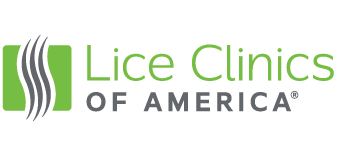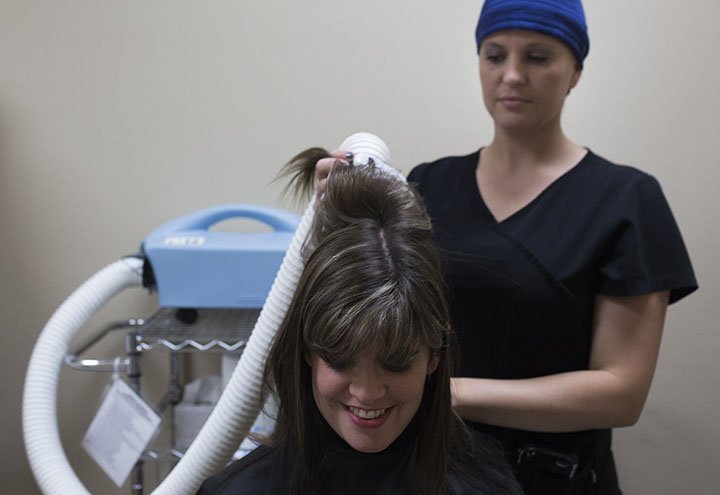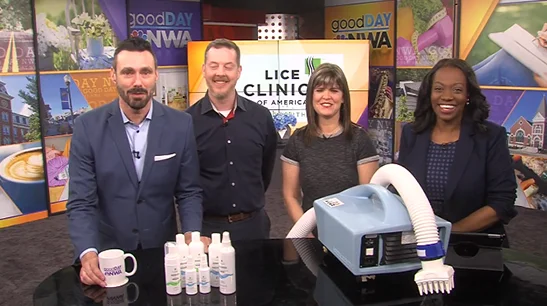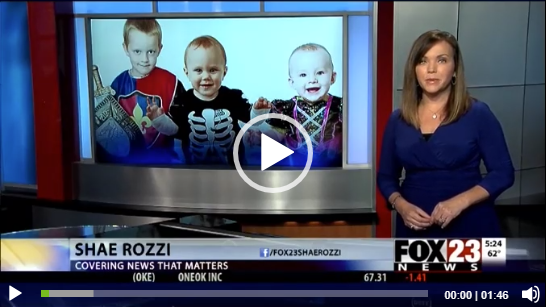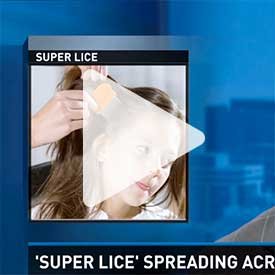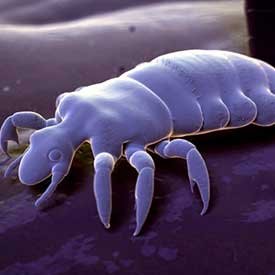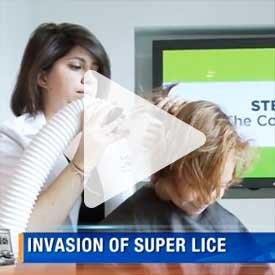Breaking News in Lice Treatment
Lice Clinics of America | Mid South
Breaking news in lice treatment and super lice this season. This section includes news articles published about the Lice Clinics of America network or one of our lice clinic locations.
Ask The Experts
January 2023
Do you have to comb to treat lice?
Yes and no. If you use Rid, Nix or any other pesticide to treat, then you must comb out the nits (eggs). If you don’t, the next wave will hatch, and the infestation will continue. In fact, these are called “comb-out treatments.”
Modern medical treatments do not require combing. At Lice Clinics of America, treatments are completed with the FDA-cleared AirAlle medical device. The treatment dehydrates and kills all bugs and eggs, eliminating the need for a strand-by-strand egg removing comb-out. Not only does dehydration treatment save an enormous amount of time, it’s also much more comfortable for the patient. Speed, comfort and no pesticides make dehydration treatment much more appealing for moms of young kids. As does its effectiveness, with a success rate of over 99%.
State governments are increasingly recommending medical dehydration treatment. Most recent was the State of Arkansas, which updated its recommendations in the fall of 2022 to include dehydration.
Ask The Experts
December 2022
What time of year are you most likely to get head lice?
Head lice is always present in the community. The CDC says 5% of the population has head lice at any given time, usually concentrated in girls between the ages of 4 and 14. In a school of 500 children, it is realistic to assume there are 30-35 children who are lice positive.
Lice are most often treated in the summer months. It is difficult to say if lice are more prevalent at this time of year, or if families are spending more quality time together and lice is more likely noticed.
My recommendation would be to set a monthly reminder to really look over your child’s hair. This includes teenagers who typically maintain their own hair. If you want to perform a more thorough check, pick up a professional lice comb at Lice Clinics of America or book a head check with one of our certified technicians.
Ask The Experts
September 2022
Why do schools let kids with lice back in school?
Most Tulsa area schools allow children with lice to attend but grant local administrators the ability to remove children with the most severe cases. Sadly, most of these cases are ineffectively treated at home with over-the-counter medications, and the children are returned to class only to become severe cases again within weeks. It is not uncommon for children to have lice for months or even years. While this may be shocking to parents, this policy is in line with both state guidelines and the American Academy of Pediatrics, which advocate leaving lice-positive kids in school. Student outcomes are better when they are in class, so every school district crafts a policy with that in mind.
Reduce Lice in Schools: Be open with other parents about lice, everyone has the same secret. Thoroughly check your child’s hair once per month, especially if they brush their own hair. Over-the-counter treatments are less than 25% effective, seek professional treatment.
Lice Clinics of America in Oklahoma and Arkansas Report Lice Activity Increase During Pandemic
With Families Isolating at Home, Lice Infestations Are Intense
August 6, 2020
Tulsa, OK – Lice Clinics of America–MidSouth, part of the Lice Clinics of America 200 network, reported an increase in lice treatments of 42 percent in their two Oklahoma clinics and a 69 percent increase in their Arkansas clinic from April to May of this year, amid the COVID-19 pandemic. Head lice infestations affecting the entire family have been more severe during the pandemic, likely due to the fact that families have isolated at home together.
“We were able to stay open throughout the pandemic, seeing families one at a time in our clinics,” says Jessie Foley, Director of Clinics for the three MidSouth clinics in Oklahoma City, Tulsa, and Lowell, Arkansas. “Our staff wear masks and all clinics practice thorough cleaning protocols. We also screen clients regarding their health so if they have respiratory distress or a temperature, they can reschedule.”
According to the Centers for Disease Control and Prevention (CDC), “Head-to-head contact with an already infested person is the most common way to get head lice. Head-to-head contact is common during play at school, at home, and elsewhere, such as sports activities, the playground, slumber parties, and camps.” The CDC estimates 6-12 million infestations occur each year in the U.S. among children 3-11 years of age.
Dr. Krista Lauer, Medical Director of LCA, states, “If you have children who are elementary and middle-school ages, it’s important to take some immediate steps to either prevent your children from being infested or to properly treat and kill the lice before they spread to others in your family and social group.”
Dr. Lauer says, “First, don’t panic, and second, don’t be embarrassed. A head lice infestation has nothing to do with personal hygiene or the cleanliness of your environment. In fact, with recent self-isolating orders, head lice infestations more easily spread to everyone in the household due to close proximity.”
She recommends the following to make sure lice aren’t living in your child’s hair:
- Inspect your own head and your child’s, especially if your child has an itchy scalp. Look for eggs, nymphs, and adult lice. One adult louse can lay about a hundred eggs during her life span. That’s a lot of new lice.
- Call the parents of your child’s friends and have them check for head lice, remembering that earlier intervention can help to reduce the infestation level. With shelter-in-place orders being lifted, kids are playing together again, and summer camps are in session.
- If you see lice—or if you are unsure whether you have lice—visit a professional lice treatment center such as Lice Clinics of America for a screening.
- Traditional over-the-counter treatments contain pesticides that are ineffective. Lice have evolved into “super lice” and have developed resistance to those pesticides. Find a treatment that is safe and effective. Lice Clinics of America has several options to choose from.
In terms of lice activity still happening in large numbers amidst a pandemic when most people are staying home and social distancing, “We’ve found that the one individual that had lice spread it to the entire family during the quarantine. Instead of seeing one or two individuals at our clinic, we’re seeing more families,” says Foley. “The level of infestations was still mild to moderate but were spread across multiple individuals.”
Lice Clinics of America is the world’s number-one service brand for treating head lice. The company’s revolutionary heated-air treatment is guaranteed to kill lice, lice eggs, and super lice in a single, one-hour treatment. Lice Clinics of America offers professional lice screenings and a full line of top-rated lice treatment and prevention products including professional solutions for parents with children at home.
For more information visit www.liceclinicsofamerica.com.
News Segment on Fox News 23
Local experts warn Halloween is busy season for head lice
by Michelle Linn, FOX 23 News | October 10, 2018
Local experts are warning people about Halloween season being a popular season for head lice.
Jessie Foley, Director of Lice Clinics of America in midtown Tulsa said it takes only three seconds for one bug to be transferred from person to person.
She said August is the clinic’s busiest month due to students headed back to school, but they tend to see a spike in business around Halloween.
The lice bugs can live up to 48 hours on plush material like hats, wigs, and costume masks. Foley is warning people against trying on plush masks or wigs for Halloween costumes.
Treatments at Lice Clinics of America cost $175 and take 90 minutes to complete. They say the treatment is 99.2 to 100 percent effective in dehydrating and killing live lice and eggs.
How to avoid scary Halloween head lice
Halloween is peak season for lice infestations, and kids are the most susceptible.
BY MADELINE EWING
TuslaPeople.com
With Halloween around the corner, Tulsans are gearing up with spooky costumes, decorations and snacks. However, vampires aren’t the only blood-thirsty prowlers around. Halloween is peak season for lice infestations, according to Wade Huntsman, owner of Lice Clinics of America Tulsa, 3336 E. 32nd St., .
While everyone can contract lice, kids are the most susceptible.
Huntsman advises taking preventative measures to avoid contracting lice in the first place. Wigs, hats, masks and costumes can all be temporary homes to lice. It is best to avoid sharing or trying on these garments altogether. If contact with lice is unavoidable, the Lice Clinics of America encourages the use of peppermint or tea tree oil spray on any person or surface to repel insects and decreases the chance of lice transferal.
Peppermint spray can be purchased at Lice Clinics of America locations or health-food stores. The peppermint or tea tree oil sprays are only preventatives, not treatments, so it cannot do anything once lice is contracted. Lice can survive in water, so washing hair has no impact.
“All it takes is one bug, and you’ve got the whole process started on your head,” Huntsman says. “It happens very, very rapidly, and in a month’s time, you can have quite an infestation from a single bug.”
These parasites live and lay eggs in human hair, usually close to the scalp. Although lice do not carry diseases or bacteria, they repopulate and transfer easily, so immediate and effective removal is necessary. The Lice Clinics of America performs FDA-cleared treatments with a 99.6% success rate, without the use of toxic chemicals.
In a clean, salon-like space, clinicians treat patients’ heads with the patented AirAllé® device, which uses heated air to dehydrate and kill lice and eggs. After this 90-minute process, which also includes a professional comb-out of the dead debris and an application of non-toxic dimethicone oil, the patient walks away lice-free with a 30-day guarantee.
“With almost every single patient, you’ll hear a mom say, ‘I had no idea places like this existed!’” Huntsman says.
Although some other over-the-counter lice treatments kill lice, they do not kill their eggs, which can later hatch and start an infestation all over again. Nix, one such treatment, is no longer effective, according to Huntsman. “It started in 1984 and was effective, but by 2008, it was only 25% effective,” Huntsman says.
Super Lice, which are prevalent in Oklahoma, are pesticide-resistant. “I cannot emphasize this enough,” Huntsman says. “It’s why centers like this exist today.”
Lice Clinics of America Tulsa works with school nurses from surrounding districts to ensure families know its services are available.
Arkansas Democrat Gazette
Options Vary For Dealing With Head Lice
Soccer Coach Helps Northwest Arkansas Families Cure Head Lice with New Lice Clinic
Lice Clinics of America – Northwest Arkansas provides guaranteed, one-and-done lice treatments using FDA-cleared medical device that succeeds where traditional products fail.
Lowell, Arkansas
Springdale native Wade Huntsman is a former soccer coach and previously served as president of Oklahoma’s largest soccer club, Metro Tulsa Soccer Club’s United. These days, he spends his time helping Northwest Arkansas children and parents win the battle against head lice with a new Lice Clinics of America® treatment center in Lowell.
“I coached soccer for 15 years and love being around kids,” Wade said. “I’ve experienced head lice first hand with my daughters, and I’m excited to bring this solution back home to Northwest Arkansas. Up until recently, these state of the art treatments were only available in larger markets such as Dallas and Kansas City.”
Lice Clinics of America – Northwest Arkansas provides head checks, diagnosis, and treatments for people infested with head lice. The clinic is staffed by certified operators of the AirAllé® device, an FDA-cleared medical device clinically proven to kill 99 percent of head lice using warm air to dehydrate lice and eggs.
“Nothing makes you a believer in Lice Clinics of America quite like seeing it work so well on your own kids,” Wade said, and he thrives on coaching families through the game of lice. “Now I love being there when the families come in panicked, frazzled, and embarrassed so that I can start turning that attitude around.”
The battle against head lice has gotten far more difficult in recent years as head lice have become resistant to the chemical pesticides in most popular lice products. A recent study found that so-called “Super Lice” comprise 98 percent of head lice in most states.
The AirAllé device doesn’t use pesticides or toxic chemicals. Instead, it applies precision-controlled heated air to the hair and scalp to dehydrate lice and eggs (nits) on the spot.
“Super lice is the norm now in our part of the country, and last generation’s over-the-counter products just don’t work anymore,” Wade said. “We are focusing on getting the word out to parents and have partnered with the major local school districts to train nurses about how dehydration is the only effective way to cure head lice.”
Most treatments using the AirAllé take about 90 minutes, and the treatment is guaranteed to be effective. The AirAllé has successfully treated more than 950,000 cases of head lice worldwide.
The Northwest Arkansas clinic is located in Lowell, at 207 East Monroe Ave, Suite D, and is open seven days a week, 8:30am to 8:30pm by appointment only.
With more than 400 clinics in 36 countries, Lice Clinics of America (www.LiceClinicsOfAmerica.com) is the largest network of professional head-lice treatment centers in the world. Lice Clinics of America and AirAllé (www.airalle.com) are brands owned by Larada SciencesTM, Inc., which is headquartered in Salt Lake City, Utah.
Background:
Owner Wade Huntsman was raised in Springdale and graduated from Springdale High School and the University of Arkansas, as did his wife, Susan.
Jessie Foley is the Director of Clinics and is also a graduate of the University of Arkansas.
News on 6
Good Day NWA
NBC Charlotte
‘Super lice’ invade North Carolina
